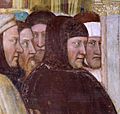Humanism facts for kids
Humanism is a way of thinking about the world and how people should live. People who follow these ideas are called humanists. Humanists believe in using critical thinking and evidence to understand things. They prefer facts and logic over old beliefs or superstitions.
Today, humanism is often linked to secularism. This means it's a way of life that doesn't rely on religion. Instead, humanists look to science to understand the world. Many scientists in the mid-1900s helped make this idea well-known. They wanted to value human ideas and actions without needing religion as the main guide.
Contents
What Humanists Believe
Many humanists share these important ideas:
- Respect for people: Every person should be treated with respect. Everyone deserves to have dignity. If people respect each other, they can live in peace and trust.
- Freedom to choose: People should be able to decide how they want to live their lives. They should use reason and logic to make choices and solve problems.
- Making the world better: Humanists decide if a choice is good by asking if it will help make human life better. They also think about how it will improve the world around them.
History of Humanism
Ideas similar to humanism were discussed a long time ago in Ancient Greece. Thinkers like Thales and Protagoras explored these ideas. Teachings from Zarathushtra and Lao Tzu also had strong humanist elements. There are many other examples throughout history.
Renaissance Humanism
In the 1400s, during the Renaissance, people studied the writings of the ancient Greeks again. During this time, the word "humanism" often meant being educated in the humanities. This was a bit different from its meaning today. Petrarch is often called the first modern humanist. However, he mostly looked back to old classical writers.
Modern Humanism
The modern meaning of humanism is more about using science to make the world a better place. In 1925, the English mathematician and philosopher Alfred North Whitehead said something interesting:
- "The prophecy of Francis Bacon has now been fulfilled; and man, who at times dreamt of himself as a little lower than the angels, has submitted to become the servant and the minister of nature. It still remains to be seen whether the same actor can play both parts".
This means humans have learned a lot about nature through science. Now, we need to see if we can use that knowledge wisely.
Images for kids
-
Portrait of Petrarch painted by Altichiero in 1376
-
Richard Dawkins accepting the Services to Humanism award 2012 at the British Humanist Association Annual Conference
See also
 In Spanish: Humanismo para niños
In Spanish: Humanismo para niños
 | Leon Lynch |
 | Milton P. Webster |
 | Ferdinand Smith |



